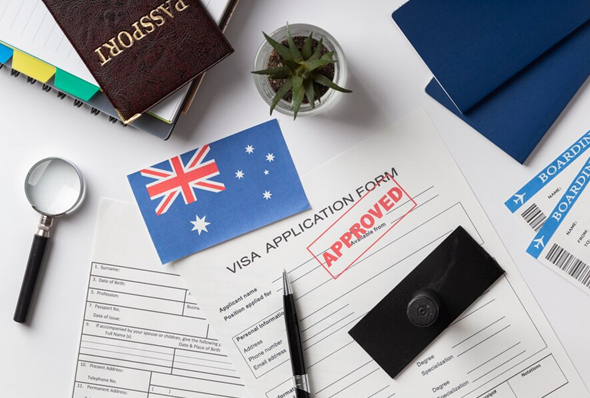Planning to pursue higher education in Australia? Don't know how student visas work? Look no further, we got you! This article breaks down everything you need to know about Australian student visas (Subclass 500), from visa rights, fees to requirements.
What is Student visa Subclass 500, and what does it cover?
- The Student visa (subclass 500) allows you to live, work and study in Australia.
- The length of stay of your student visa depends on the course you have been accepted in, but the maximum is 5 years.
- With this visa, you can:
- Work a maximum of 40 hours per fortnight, and unlimited hours during study breaks. (But right now, there are temporarily relaxed work hours, which means that international students have unlimited working hours until July 2023!)
- Bring family members to Australia with you - but there are extra fees and requirements for this.
How much are Student visa fees? How long does it take to process?
- Student visa fees are from AUD$650 per visa application.
- Visa processing time varies from person to person, but you can check for further information on this at the Department of Home Affairs official site here: https://immi.homeaffairs.gov.au/visas/getting-a-visa/visa-processing-times/global-visa-processing-times
What are the requirements of a Student Visa?
1. Letter of Offer
- You will receive a Letter of Offer from your education provider if your application was successful.
- This will include your course details, enrolment conditions, and fees you need to pay if you accept the offer.
- Make sure you read the refund arrangements: if you don't start or finish your course, this will be used to determine whether you get a refund or not.
- Keep a copy of the Letter of Offer so that you are aware of your rights, and may use it if you have to make a claim against the institution.
2. Confirmation of Enrolment (CoE)
- The CoE will be sent to you after you have accepted your offer and paid your deposit.
- This document is issued by your education provider, which verifies your enrolment in a specific course.
- You must include a copy of this document in your visa application as proof that you are registered in your declared course.
3. Proof of English Proficiency
- If you are not a native English speaker, you need to provide a certificate from an approved English language test.
- Tests accepted by the Australian Government are IELTS, TOEFL, TOEIC, Cambridge, PTE, and OET
- There are different minimum requirements for each education level, and education providers sometimes set these requirements higher.
- You can check for more details on this at the Department of Home Affairs official site here:
- https://immi.homeaffairs.gov.au/help-support/meeting-our-requirements/english-language/proficient-english
- Be sure to check your desired education provider's website for their requirements as well!
4. Genuine Temporary Entry (GTE) Statement
- You must write a statement that addresses 2 criterias:
- You are genuinely coming to Australia to study, and not for any other reason.
- You will only be residing in Australia temporarily, not overstaying your visa.
- In your GTE statement, the main points to cover are:
- The connection between your previous studies and the intended studies.
- The connection between your intended studies and job opportunities.
- Job offers or opportunities in your country after graduation.
- Incentives to return to your country (family, business, cultural and society ties, your contributions to your country…. etc.)
- Reasons for not pursuing your intended course in your own country
- Your migration history.
- If you need any help, feel free to reach out to our course advisors, or check out our blog on how to write a GTE:
- https://www.educonnect.com.au/blog/1-genuine-temporary-entrant-requirement/
5. Proof of Sufficient Funds
- This is to prove that you have enough money to support yourself throughout your stay.
- Two options for meeting this requirement
- Bank statements, evidence of grants or scholarships
- Supply proof of your parent's or partner's annual income - this must be AUD$62,222 in the year immediately before you apply. If you bring family members, it must be at least AUD$72,592
- You can check for more details on calculating exactly how much you need to prove at the Department of Home Affairs official site here:
- https://immi.homeaffairs.gov.au/visas/getting-a-visa/visa-listing/student-500#HowTo
- (Click on "Gather your documents", and then "Evidence you have enough money for your stay")
6. Overseas Student Health Cover (OSHC)
- You must have proof that you have bought student health insurance for the duration of your stay.
- OSHC will help you:
- Pay for medical or hospital care while studying in Australia
- Pay for most prescription medicines
- Provide ambulance cover in emergencies
- Find out where to purchase OSHC and what it covers at this website:
7. Health Requirements
- The Australian Government requires all international students to be in good health before entering the country.
- Therefore, you may need to undergo a health examination and provide a medical certificate confirming this requirement.
- Find out more about this at the the Department of Home Affairs official site here:
8. Character Requirements
- In your student visa application, you have to answer some basic questions about your character and past conduct.
- Sometimes, you may even need to provide a police background check.
- You can check for more details on this at the Department of Home Affairs official site here:
And that wraps up everything you need to know about Student visa (Subclass 500)! If you have any further questions, or need help in preparing documents, calculating expenses, writing statements, or simply looking for the right institute and course for your circumstance, reach out to Educonnect now to talk to our advisors (for free!) - Let us help you in pursuing higher education in Australia.
Related Blogs
-

Preparing the GTE for Student Visa in Australia
Have you decided to pursue education in Australia? If you have already set your heart on studying .....
-

Latest Update on Australian Student Visas
Introduction of the Genuine Student Criterion Are you contemplating pursuing your studies in Aus .....
-

The Best Guide to Understand the Australian Student Visa (subclass 500)
Australia attracts international students with its world-class education system and vibrant cultural .....